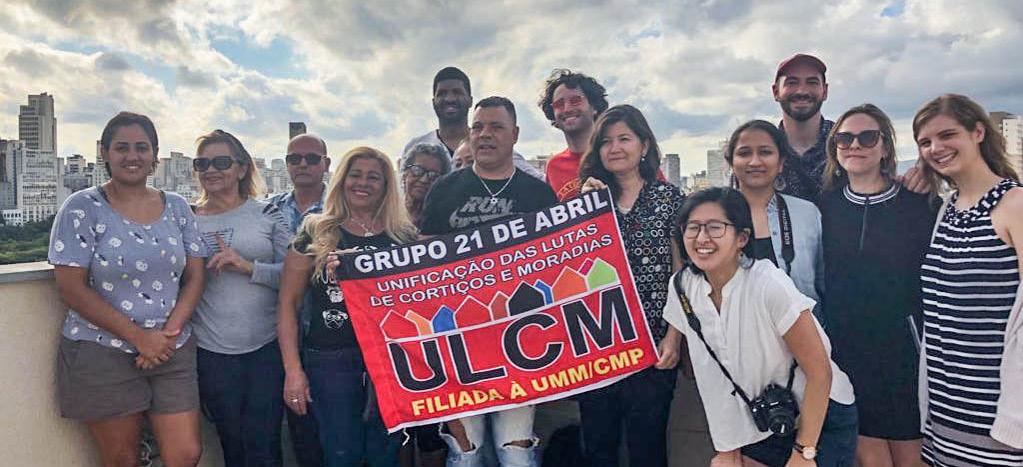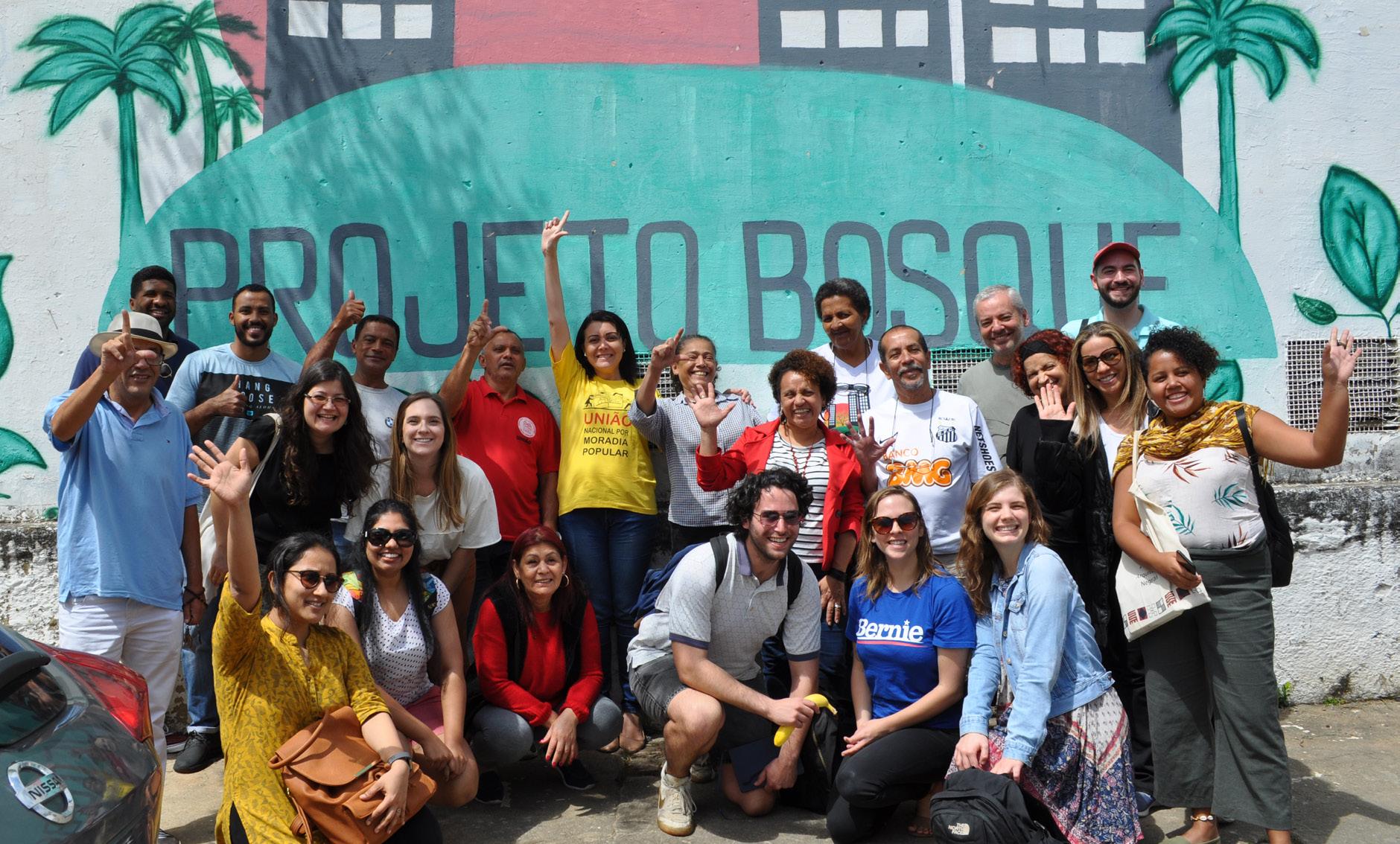
5 minute read
FINAL THOUGHTS � � � � � � � � � � � � � � � � � � � � � � � � � � � � � � � � � � � � � � � � � � � � � � � � � �
from Self-Management Law, Now! Fostering Community-Owned, Permanently Affordable and Sustainable Housing
Urban planners play a unique role as educators, policy makers, and technical experts in the realm of housing and land use and possess the ability to draw on interdisciplinary connections to create the framework for a more equitable future. Our capstone team — comprised of urban planning, architecture, and public policy students — was given a unique opportunity to be a part of an incredibly strong and inspirational housing movement. The movement does not lack expertise or manpower, but rather the programmatic and financial support necessary to scale up and bridge the gaps left by the profitmotivated housing market. In this context, our team sought to lend support to the movement by advocating for the legislative framework drafted by UNMP, which would provide the necessary mechanisms for a significant scaling up of autogestão housing. The team achieved this ultimate objective through several deliverables hosted on a dynamic, widely accessible, and interactive website. The deliverables can be broadly categorized as:
• Easily digestible and shareable educational materials that describe Brazil’s housing crisis, autogestão, and collective property.
These materials inform movement members and the public more broadly of key issues and how autogestão and collective property may forge a better way forward for housing production in Brazil.
• Storytelling and interactive mapping, with a specific emphasis on amplifying the voices of those low-income individuals and families, mostly women of color, who became the protagonists of housing solutions by pioneering the self-management model.
• Complex policy research, demonstrating the ubiquity of autogestão and collective property worldwide, highlighting the key facets of successful programs, and providing specific recommendations for UNMP’s proposed bill.
• Environmental policy and planning, specifically through work with the Mutirões
Dorothy Stang, Jerônimo Alves e Martin
Luther King site, but also through the creation of a highly transferable and easily understandable suite of APP resources for use by housing projects facing environmental challenges.
It is our hope that these components reach a broad audience, making people aware of these issues and the solutions possible through autogestão, and ultimately assist in the successful passage of UNMP’s self-management framework as a national bill. While the capstone team entered this project equipped with a wide variety of skills and expertise to offer our client, we were continuously learning and endlessly inspired by the movement. In this way, we feel the project was truly collaborative, long-lasting, and impactful.
NEXT STEPS
The use of a website to host all of the team’s deliverables allows for a uniquely sustainable product. The website will be transferred to the client’s domain so that the content can grow and adapt over time at the client’s discretion. This is particularly useful given the website’s main goal of advocating for UNMP’s law for self management. Although it is unclear when the bill will be officially introduced, it is likely that the policy passage process will be a lengthy one. The adaptable website will allow the client to post news and updates relevant to the bill, update the bill text and continue to seek feedback from the public, and add new advocacy tools as they become necessary in the legislative process. The user-friendly mapping platform will allow UNMP to highlight additional self-management sites as more projects are completed, or as they input more data for existing projects. UNMP may use the website to continue highlighting the success of selfmanaged housing — especially if and when the bill gets passed — and to continue telling stories of hope and optimism amidst a devastating housing crisis.
Financial sustainability is an important goal of this project as well. The team is currently applying for grants to help support UNMP and especially the Mutirões Dorothy Stang, Jerônimo Alves e Martin Luther King site for which we designed an environmental engagement proposal. Unfortunately, the COVID-19 pandemic has delayed most available funding. As grant application cycles and deadlines continue to be modified in the wake of the virus, the team plans to continue to monitor and apply for various awards as they come back online. In addition, the team is preparing a grant resource starter kit that will help expedite the application process. This will ensure that future cohorts of students can quickly and easily continue to apply for grant funding to sustain this project in the years to come.
REFLECTIONS ON OUR ROLE
Our experience with the movement shaped the way we will move forward in our planning careers. We saw the power of social movements to mobilize and achieve political change for


better housing conditions, but also for improving the lives of members: we heard stories of women finally able to leave abusive relationships thanks to housing provided by the movement, of residents finding new and fulfilling employment through their connections with other members, and of organizers who found their voices for the first time as participants of a struggle in which the collective good is valued above all else. As Diana, a resident of the Paulo Freire project, told us: “The movement shows you how to move your life forward, and we can hold on to that. I can’t picture myself not being part of the movement.”
We learned about self-managed housing tenure structures that do not exist in the American context. The trip showed us firsthand the pride and community built through self management and the way that this kind of organizing empowers everyday people while allowing for opportunities to build wealth across generations. Through interviewing residents of the projects, we were frequently moved by the dedication so apparent amongst movement members to their dreams of a stable home for themselves and for their families. The social movements represent millions of people across Brazil. Our small team of ten students and one faculty advisor emerged from this project with a deep understanding that change can only happen through the sustained, dedicated, and collective effort that we witnessed during our fieldwork. We now see our role within that framework as partners, not saviors; organizers, not technocrats; champions of the public, not private. In autogestão, we see a vision of the future where housing provision no longer rests on the whims of shifting political tides and the for-profit market, women are empowered to be agents of their own lives, families live without fear of eviction, and communities thrive outside the threat of housing insecurity. This project was never about us. Through this work, we were welcomed into a movement that will exist long after our capstone comes to a close. The movement reaches far beyond the need for housing, speaking to the value of human lives rooted in dignity and self empowerment.
In solidarity, from São Paulo to Ann Arbor, we rise to demand a better world together.








